Iowa Supreme Court's abortion ban ruling bares deep split on court. Each justice's record:
The Iowa Supreme Court has finally answered, at least for now, the most important question about Iowans' abortion rights.
After three rulings in as many years, the seven justices on the court ruled Friday that the right to access an abortion is entitled to only the lowest level of protection under the Iowa Constitution. Justices Matthew McDermott, Christopher McDonald, Dana Oxley and David May ruled that Iowa's six-week "fetal heartbeat" abortion ban can go into effect, dramatically restricting the availability of abortion across the state.
The court was far from unanimous. Three justices — Edward Mansfield, Thomas Waterman and Chief Justice Susan Christensen — strenuously argued that the Iowa Constitution should provide stronger protections for abortion rights.

In fact, since 2022 nearly all of the justices have gone on the record with their views on abortion under the Iowa Constitution. Despite each being nominated to the bench by Republican governors, their writings showcase a range of opinions and approaches to the law.
To understand their views, one must understand the standards used in constitutional law. If a court finds a given right to be "fundamental" under the state or federal constitution, meaning a right "deeply rooted" in legal history and tradition, any laws that infringe that right are held to what is called "strict scrutiny." That means the law must be "narrowly tailored" to address a "compelling" government interest. Very few laws survive this standard of review.
If a law does not implicate a fundamental right, it instead is evaluated under the "rational basis" standard. Here, the government must show only that the law is rationally connected to a "legitimate" state interest. Very few laws fail to cross this hurdle.
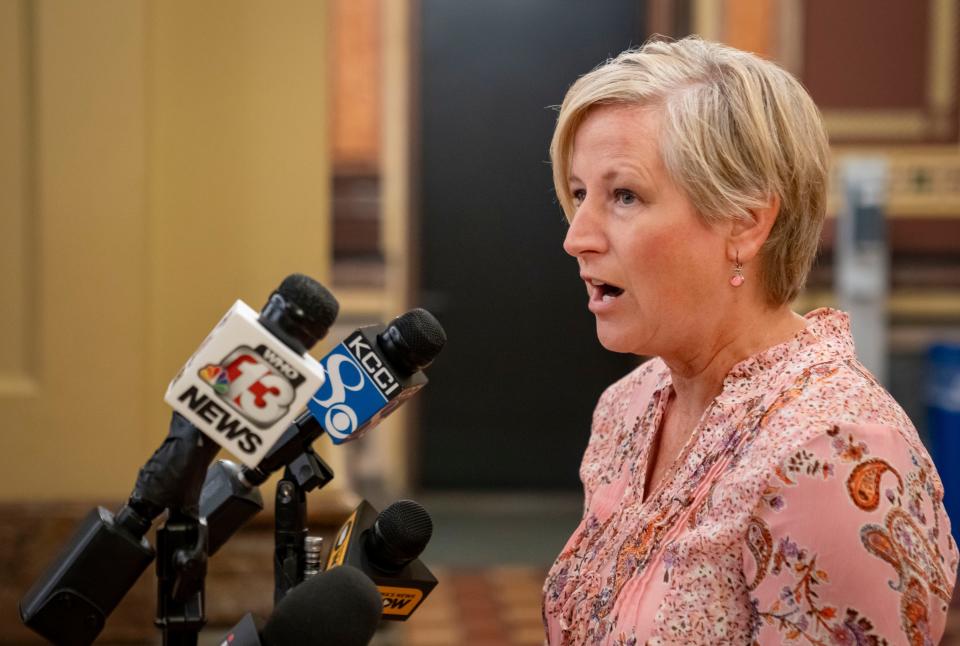
Before 2022, the U.S. Supreme Court recognized an intermediate test for laws restricting abortion. Known as the "undue burden" standard, it forbade laws that imposed a "substantial obstacle in the path of a woman seeking an abortion before the fetus attains viability."
Friday's ruling struck down an injunction by a Polk County court that barred enforcement of a 2023 Iowa law banning abortions after fetal cardiac activity, which the law calls a "fetal heartbeat," can be detected — usually in the sixth week of pregnancy and often before a woman knows she is pregnant. The law allows exceptions for rape, incest, fetal abnormality or to save the life of the mother.
For three years, Iowa's justices have wrestled over which doctrines should apply under the Iowa Constitution. Here's what we've learned from the court's opinions about each justice's views.
READ: Friday's decision allowing Iowa's 6-week abortion ban to take effect
Justice Matthew McDermott
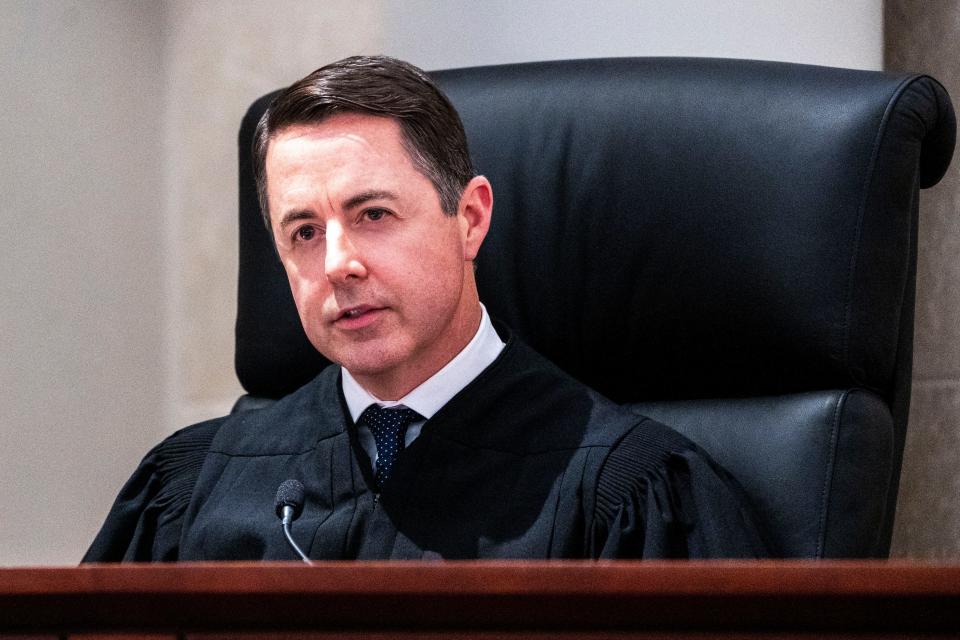
Justice Matthew McDermott, who wrote Friday's opinion upholding Iowa's six-week ban, has made clear he views constitutional interpretation as a binary choice. If a right is fundamental, strict scrutiny applies. If it is not, as the Iowa Supreme Court held abortion is not in 2022, then courts should use the rational basis test.
McDermott joined Mansfield in striking down strict scrutiny for abortions in 2022, but filed a partial dissent arguing that the court should take what he considered the logical next step and declare rational basis the appropriate standard.
"Abortion rights weren’t rooted at all in our state’s history and tradition, let alone 'deeply' rooted," McDermott wrote in 2022, adding that "since the statute implicates no fundamental right, our precedents would haveus apply the rational basis test."
Planned Parenthood argued that Iowa should adopt the intermediate undue burden test, despite the U.S. Supreme Court rejecting that standard in 2022. Its attorneys argued that Iowa has adopted other intermediate standards in areas such as election law, and should do the same here.
McDermott rejected those comparisons in Friday's ruling, saying that in election cases, courts balance the fundamental right to vote against the state's constitutional obligation to run orderly elections. Since there is no fundamental right to an abortion, he said, there is nothing to balance.
And he criticized the undue burden test specifically, writing that it "inevitably leaves courts unable to provide predictability, consistency, or coherence in its application. … Stated simply, we can find no principled basis under our due process precedents to apply the heightened scrutiny of an undue burden test to abortion."
McDermott's majority opinion comes after his partial dissent in 2022, and a nonbinding opinion in 2023 expressing frustration that the court was "ducking" its obligation to provide certainty for policymakers. In that deadlocked case, McDermott criticized Waterman's opinion for, in his view, trying to delve into legislators' motivations instead of interpreting, and upholding, the law they passed.
"We fail the parties, the public, and the rule of law in our refusal today to apply the law and decide this case," he wrote last year, joined by Justices McDonald and May.
READ: The court's deadlocked 2023 opinions
From 2023: Supreme Court justices trade barbs in contentious non-decision in abortion case
Justice Christopher McDonald
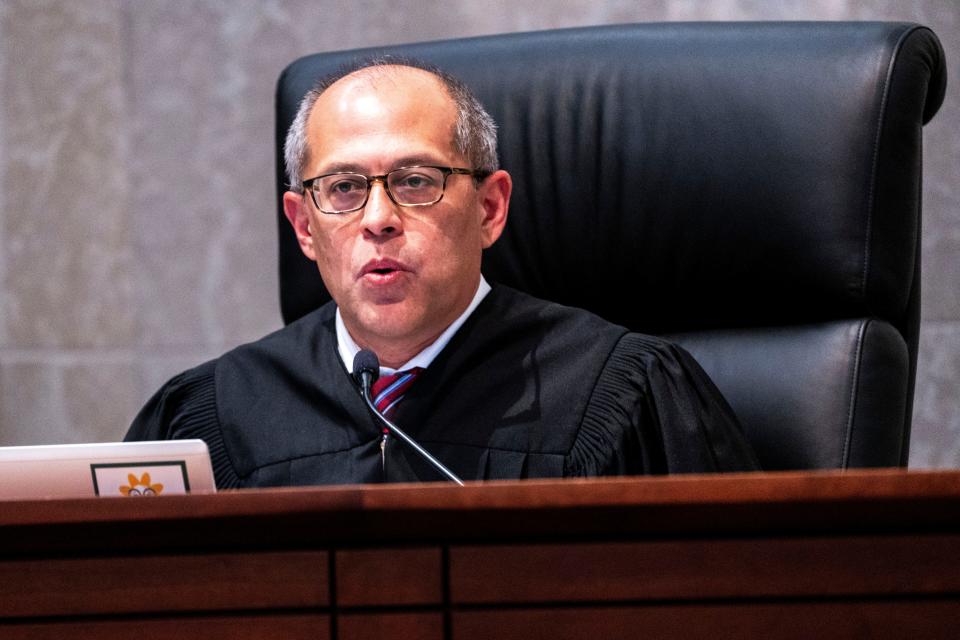
Like McDermott, Justice Christopher McDonald has maintained since 2022 that Iowa abortion laws should be held to the rational basis standard.
McDonald joined McDermott's partial dissent in 2022, and his nonbinding opinion in 2023, both arguing for rational basis. He also wrote his own opinion in 2023, joined by May and McDermott, criticizing the three other justices' opinion.
Waterman, Mansfield and Christensen "refus(ed) to apply well settled Iowa law" by refusing to unblock an earlier version of Iowa's six-week abortion ban, and failed to explain why they believed Iowa law should diverge from federal constitutional law in the wake of the 2022 decision overturning Roe v. Wade, McDonald wrote.
"I disagree with this results-oriented approach to deciding cases," he wrote, accusing the other justices of reversing their own prior precedents to avoid a policy outcome they opposed.
READ: The court's 2022 decision holding abortion is not a 'fundamental right'
Justice David May
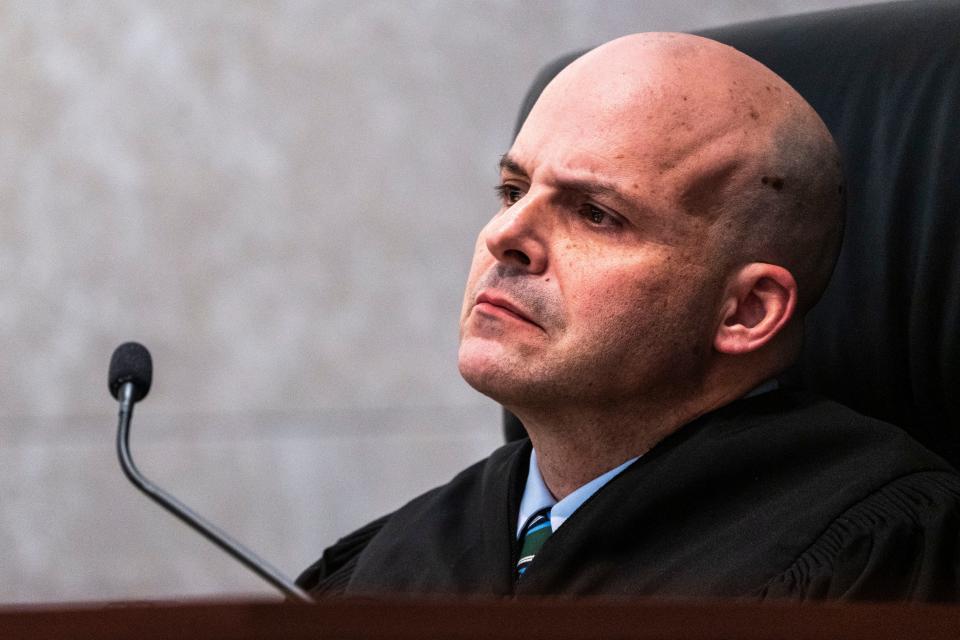
The newest justice, David May joined the court in July 2022 and didn't take part in the June 2022 ruling ending strict scrutiny for abortion laws. He did not author his own opinions in either the 2023 or 2024 cases.
Based on where he's cast his votes, he appears to be solidly aligned with McDermott and McDonald on abortion issues. In 2023, he signed on to both justices' opinions urging the court to adopt rational basis review. On Friday, he joined McDermott's opinion as a member of the four-justice majority.
Timeline: How Iowa's abortion laws have changed over the decades leading to Friday's ruling
Justice Dana Oxley

Like May, Justice Dana Oxley also has not written any opinions herself over the past three abortion cases. Despite this, her position has been hotly scrutinized leading up to Friday's ruling.
In 2022, Oxley joined entirely in Mansfield's plurality opinion, striking down strict scrutiny protections but declining to say what should replace it. She did not join McDonald or McDermott in calling for rational basis review, suggesting either that she disagreed with them or, at minimum, agreed with Mansfield that it was procedurally improper to reach that decision.
In 2023, Oxley recused herself from that year's case. While the court did not give any explanation, Oxley had still been in private practice at the time the lawsuit was filed and worked for a law firm representing one of the plaintiffs. Her absence left the court deadlocked, with three calling for rational basis review and three seeming open to the undue burden standard, and raised the likelihood that she could provide the tie-breaking vote for one side or another in a future case.
On Friday, she did just that, joining McDermott's majority opinion and setting the standard at rational basis.
Justice Thomas Waterman

One of the two most senior justices on the court, Thomas Waterman dissented in the 2018 case setting Iowa's standard for abortion law at strict scrutiny, and joined Mansfield's plurality opinion reversing that case in 2022. He did not, though, join McDermott and McDonald in calling for the state to apply rational basis review.
In 2023, he wrote for one side of the 3-3 deadlock to champion the undue burden standard. Joined by Mansfield and Christensen, Waterman argued that women have a compelling legal interest in "autonomy and dominion over one's body," even if that did not trigger strict scrutiny under the Iowa Constitution.
"The undue burden test balances the state’s interest in protecting unborn life and maternal health with a woman’s limited liberty interest in deciding whether to terminate an unwanted pregnancy," Waterman wrote.
In Friday's decision, Waterman did not write for himself but joined both Mansfield and Christensen in their dissenting opinions.
More: Here's what you need to know about the Iowa Supreme Court's ruling on 6-week abortion ban
Justice Edward Mansfield
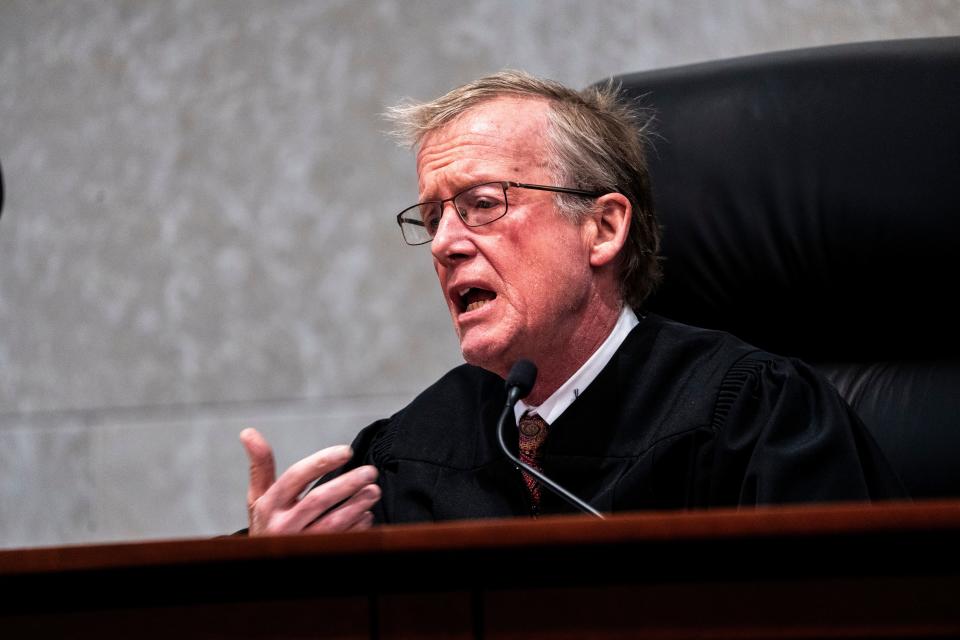
Justice Edward Mansfield occupies a central place in Iowa's abortion jurisprudence. He wrote the dissenting opinion in 2018 opposing the use of strict scrutiny, and he wrote the 2022 decision reversing that case but declining to impose another standard in its place. At the time, Mansfield suggested the court wait to see how the U.S. Supreme Court would rule in the case that eventually overturned Roe v. Wade.
In 2023, though, Mansfield joined Waterman's opinion defending the undue burden standard, despite the U.S. Supreme Court having rejected it. And on Friday, he dissented from McDermott's opinion and argued that the undue burden standard should remain the law in Iowa.
"Instead of a constitutional rule that gives no weight to the state’s interest in human life, we now have in Iowa aconstitutional rule that gives no weight to a woman’s autonomy over her body," he wrote, adding that under the majority's view, "everyone is free, except for the 600,000 Iowa women of childbearing age who will have no legal option in our state but to carry a pregnancy to term in most circumstances."
Mansfield argued that his colleagues have misinterpreted his 2022 opinion holding that there is no "fundamental right to an abortion" that triggers strict scrutiny review. That does not mean, Mansfield says now, that there is no "fundamental right" to an abortion.
Just as courts have recognized a right to refuse medical treatment or to have children, abortion too falls under a broader right to bodily autonomy, Mansfield said. That's especially true for women, given how far their legal rights have advanced since the Iowa Constitution was adopted in 1857, he wrote.
"We can’t ignore the morality code of mid-19th century Iowa as some sort of unconstitutional anachronism,while treating the abortion law of mid-19th century Iowa as some sort of constitutional guidepost for today," he wrote.
Unlike in 2022, this time Mansfield sets forth what he believes the standard of review should be. To protect a "limited but realistic opportunity to end a pregnancy," he suggests that laws restricting abortion prior to the 16th week of pregnancy be evaluated under the undue burden standard, while permitting the state to restrict abortion in most cases after that point. Contrary to McDermott's argument, Mansfield said, "the undue burden test had resulted in a fairly consistent and predictable jurisprudence" on many issues before being struck down by the U.S. Supreme Court.
More: Planned Parenthood will continue providing abortion care in Iowa after law takes effect
Chief Justice Susan Christensen

Chief Justice Susan Christensen, Gov. Kim Reynolds' first appointment to the court, had previously kept a low profile in the abortion cases. She filed a dissenting opinion in 2022, opposing the end of strict scrutiny, but did so on the basis of respect for precedent rather than the underlying merits of the issue. She did not write in 2023, instead joining Waterman's opinion in support of the undue burden standard.
On Friday, though, the Chief Justice filed by far the most strident opinion of the case, opposing the rational basis standard. Christensen wrote that she fully agreed with the constitutional analysis in Mansfield's dissent, while also focusing on the harms she believes the law will bring.
"Despite the great strides men and women have made for women’s equality in the decades since the drafting of our state constitution, women 'are once again relegated to their traditional (and outdated) roles as only child-bearers and mothers,'" Christensen wrote, quoting from a recent Idaho case. "This law is contrary to the rights affordedunder the Iowa Constitution."
Much of Christensen's opinion focuses on the exceptions built into Iowa's six-week ban, which she argues are if anything more restrictive than those in Iowa's original 1850s abortion ban. She writes that the exceptions for rape and incest, both of which require that the abuse violate specific state laws and be reported within a set timeframe, ignore the reality that many victims are under the control of their abusers and that doctors are ill-equipped to make prosecutorial decisions.
"Physicians should not have to guess whether the patient’s narrative legally constitutes 'rape' before rendering medical treatment to the patient without fear of jeopardizing their medical license or career," she wrote.
And the statute's exception for medical emergencies, Christensen writes, "pits the life of the mother against the life of the fetus. In doing so, it treats the pregnant woman as little more than a means to an end." Because the law does not permit abortions to prevent non-fatal medical complications for the mother, Christensen warns that "this statute forces pregnant women (and young girls) to endure and suffer through life-altering health complications that range from severe sepsis requiring limb amputation to a hysterectomy so long as those women are not at death’s door."
Above and beyond its impact on pregnant women, Christensen warns that Iowa will suffer broader repercussions from the ban, including economic harm from job seekers choosing to avoid the state, and a loss of current and future physicians willing to practice obstetrics in Iowa.
Christensen also hints that she believes the Constitution protects abortion even further than Mansfield does, perhaps even to the level of strict scrutiny. She wrote she agrees with Mansfield that Iowa should "at the very least" maintain the undue burden standard for restrictions through the first 15 weeks of pregnancy, but specifically notes she did not consider the strict scrutiny standard in this case because neither party was asking for it.
"It is painfully apparent to me that the majority misapprehends the nature of the liberty at issue here," Christensen wrote. "It is not whether abortion, with the polarizing reactions it evokes, is a fundamental right but rather whether individuals have the fundamental right to make medical decisions affecting their health and bodily integrity in partnership with their healthcare provider free from government interference."
William Morris covers courts for the Des Moines Register. He can be contacted at wrmorris2@registermedia.com or 715-573-8166.
This article originally appeared on Des Moines Register: Analysis: Each Iowa Supreme Court justice's record on abortion rulings

